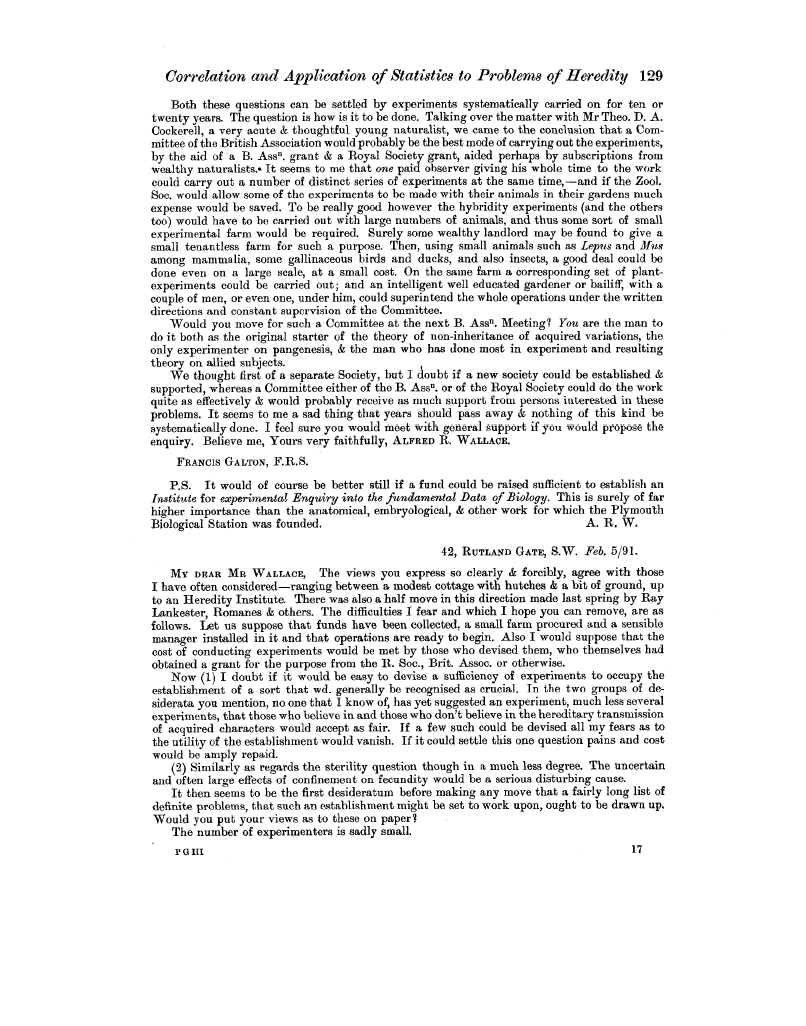| ||||||

OCR Rendition - approximate
Correlation and Application of Statistics to Problems of Heredity 129 Both these questions can be settled by experiments systematically carried on for ten or twenty years. The question is how is it to be done. Talking over the matter with Mr Theo. D. A. Cockerell, a very acute & thoughtful young naturalist, we came to the conclusion that a Committee of the British Association would probably be the best mode of carrying out the experiments, by the aid of a B. Assn, grant & a Royal Society grant, aided perhaps by subscriptions from wealthy naturalists. It seems to me that one paid observer giving his whole time to the work could carry out a number of distinct series of experiments at the same time,-and if the Zool. Soc. would allow some of the experiments to be made with their animals in their gardens much expense would be saved. To be really good however the hybridity experiments (and the others too) would have to be carried out with large numbers of animals, and thus some sort of small experimental farm would be required. Surely some wealthy landlord may be found to give a small tenantless farm for such a purpose. Then, using small animals such as Lepus and Mus among mammalia, some gallinaceous birds and ducks, and also insects, a good deal could be done even on a large scale, at a small cost. On the same farm a corresponding set of plantexperiments could be carried out; and an intelligent well educated gardener or bailiff, with a couple of men, or even one, under him, could superintend the whole operations under the written directions and constant supervision of the Committee. Would you move for such a Committee at the next B. Assn. Meeting? You are the man to do it both as the original starter of the theory of non-inheritance of acquired variations, the only experimenter on pangenesis, & the man who has done most in experiment and resulting theory on allied subjects. We thought first of a separate Society, but I doubt if a new society could be established & supported, whereas a Committee either of the B. Assn. or of the Royal Society could do the work quite as effectively & would probably receive as much support from persons interested in these problems. It seems to me a sad thing that years should pass away & nothing of this kind be systematically done. I feel sure you would meet with general support if you would propose the enquiry. Believe me, Yours very faithfully, ALFRED R. WALLACE. FRANCIS GALTON, F.R.S. P.S. It would of course be better still if a fund could be raised sufficient to establish an Institute for experimental Enquiry into the fundamental Data of Biology. This is surely of far higher importance than the anatomical, embryological, & other work for which the Plymouth Biological Station was founded. A. R. W. 42, RUTLAND GATE, &W. Feb. 5/91. MY DEAR MR WALLACE, The views you express so clearly & forcibly, agree with those I have often considered-ranging between a modest cottage with hutches & a bit of ground, up to an Heredity Institute. There was also a half move in this direction made last spring by Ray Lankester, Romanes & others. The difficulties I fear and which I hope you can remove, are as follows. Let us suppose that funds have been collected, a small farm procured and a sensible manager installed in it and that operations are ready to begin. Also I would suppose that the cost of conducting experiments would be met by those who devised them, who themselves had obtained a grant for the purpose from the R. Soc., Brit. Assoc. or otherwise. Now (1) I doubt if it would be easy to devise a sufficiency of experiments to occupy the establishment of a sort that wd. generally be recognised as crucial. In the two groups of desiderata you mention, no one that I know of, has yet suggested an experiment, much less several experiments, that those who believe in and those who don't believe in the hereditary transmission of acquired characters would accept as fair. If a few such could be devised all my fears as to the utility of the establishment would vanish. If it could settle this one question pains and cost would be amply repaid. (2) Similarly as regards the sterility question though in a much less degree. The uncertain and often large effects of confinement on fecundity would be a serious disturbing cause. It then seems to be the first desideratum before making any move that a fairly long list of definite problems, that such an establishment might be set to work upon, ought to be drawn up. Would you put your views as to these on paper? The number of experimenters is sadly small. P a 111 17
|